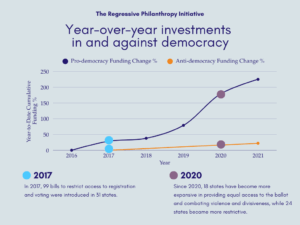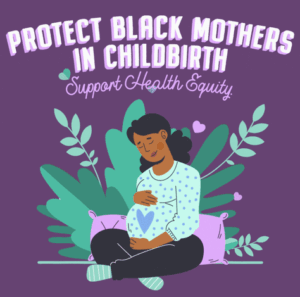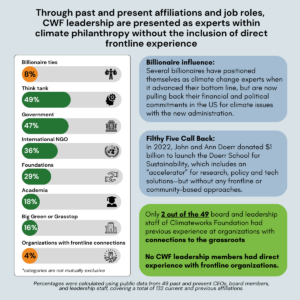This commentary was originally published on The Chronicle of Philanthropy.
In the last week, we learned unsettling information about money the Baltimore Community Foundation channeled to the police for mass surveillance of Baltimore residents.
Community foundations serve a valuable role nurturing local philanthropy and leading efforts to improve the neighborhoods, cities, and people they serve. But the funding in question, uncovered by Bloomberg Businessweek and the Baltimore Sun — from two private donors with vast wealth and influence who financed a clandestine police program — violated not just the tenets of philanthropy at its best but the vision, mission and values of the Baltimore Community Foundation.
Policing is a public good, governed by community priorities and overseen by a community’s elected representatives. When private donors conspire with a private company to subvert the public oversight process and engage philanthropic dollars in a secret policing program, they pervert this foundational democratic value.
What’s more, most of the citizens being surveilled by this program are black, and as the Movement for Black Lives policy platform points out, such government surveillance has and “continues to be concentrated within targeted communities of color, namely black, Arab, and immigrant.”
Such unwarranted and racially unbalanced surveillance could, the Black Lives platform continues, violate citizens’ constitutional rights.
Problem With Neutrality
The Baltimore Community Foundation is a tax-exempt organization created “by and for the people of Greater Baltimore” whose vision is for a Baltimore where “all have the opportunity to thrive” and where “enlightened civic leadership” based on values of trust and inclusivity can be leveraged to make Baltimore a better place for all of the city’s residents. It also calls itself a foundation “committed to transparency and accountability.”
Yet these values are undermined by their facilitation of a secret funding stream for a project that, in other communities similarly stricken by conflict and distrust between police and community, such as Los Angeles and Dayton, were rejected wholesale by democratic debate.
The Baltimore Community Foundation ought to serve the Greater Baltimore community and not just house transactional philanthropic activities that serve donors’ interests. What does the foundation stand for? How is it leading the community in the wake of a year of political and social strife over the violence visited on Baltimore residents of color by their police department?
Vocal Leaders
Many community foundations across the country are struggling with these questions. Some really do see themselves as facilitators of philanthropy by donors, without taking positions on the causes being supported. Others, like the San Francisco Foundation, have taken strong positions and are using the foundation’s reputational and financial capital to advance equity.
I urge all community foundations to undertake serious discussions about what they stand for. Many are already doing this, but far too many others aren’t. Neutrality isn’t nearly as valuable as some in philanthropy have claimed over the years, and it isn’t really even possible — as the Baltimore ordeal illustrates. For foundations, attempting to be neutral often means that the foundation — even if unintentionally — is actually supporting greater oppression rather than standing on the side of those in their communities who have the least wealth and power.
Community foundations ought to be vocal leaders on issues that impact their communities, and the only responsible way to do that is to listen — especially to those most harmed by injustice. We can learn from several leading community foundations that are acting on their values.
For example, in 2014, the Cleveland Foundation became a presenting sponsor for the Gay Games, using the foundation’s money and influence to advance LGBTQ equality. It also used the opportunity of the games to start a community-driven LGBTQ fund to accept donations and channel them to local charities.
Similarly, the Silicon Valley Community Foundation has been taking a bold stand combating predatory lending, recognizing that one in four of the people in the community it serves is cash poor and is disproportionately impacted by the abusive payday-lending industry. The foundation has also spearheaded a national coalition of community foundations to work on the issue.
These and other community foundations have a vision for their communities and are willing talk out and act on important issues. The Baltimore Community Foundation has an opportunity — and an obligation — in the coming days to begin answering questions about its vision for the community and the role of philanthropy, and of the community fund specifically, in helping to bring about that vision.
The statement the community foundation released on Friday saying it will “require government agencies to promptly and publicly disclose receipt of funds and adhere to all applicable public reporting requirements” is a start, but it is not sufficient. The leaders of the foundation owe it to their neighbors to be as transparent, accountable, inclusive, and civically minded as they claim to be.
Aaron Dorfman is president and CEO of the National Committee for Responsive Philanthropy (NCRP). Follow @ncrp on Twitter.



































































































































































































































































































































































































































